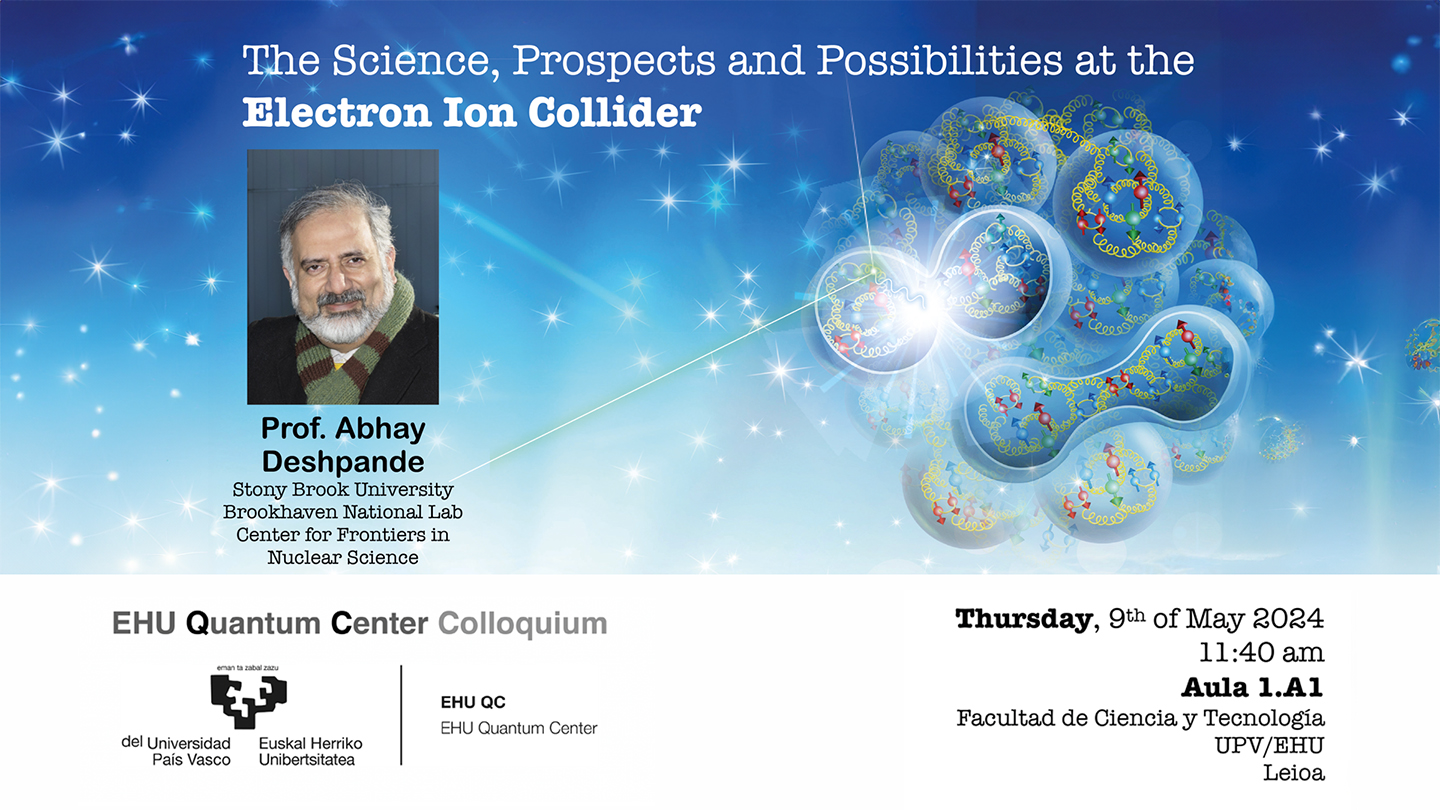The Science, Prospects and Possibilities at the Electron Ion Collider
Fecha
09/05/2024
Horario
Jueves
Lugar
Lugar
Sala de conferencias (aula 1.A.1) - Facultad de Ciencia y Tecnología
Sarriena. -48940- Leioa-Erandio (Bizkaia)

The Science, Prospects and Possibilities at the Electron Ion Collider
Prof. Abhay Deshpande
Stony Brook University Brookhaven National Lab
Center for Frontiers in Nuclear Science
Abstract:
In July 2018 the US National Academy of Sciences, Engineering and Medicine, through their Consensus Report asserted that the science of the proposed Electron Ion Collider (EIC) was compelling, fundamental and timely. The US Department of Energy Office of Science followed up based on that evaluation on the realization of the EIC. Plans have advanced since then so that the collider will be built at Brookhaven National Laboratory using one of the ion rings in the existing RHIC (Relativistic Heavy Ion Collider) tunnel. A new electron beam facility will be built for the EIC collisions to be realized. The EIC will be built jointly by BNL and Jefferson Lab working as partners. An international detector collaboration (ePIC) has been formed to be ready by early 2030s. In this talk, I will review the main science drivers of the EIC: understanding the origin of spin and mass of the proton by imaging the quark gluon structure and their dynamics in the protons and in nuclei, and also explore (and study) if a novel gluon-dominated state of matter predicted by quantum chromodynamics (QCD) really exists. I will conclude with the prospects realization of EIC and its 1st detector along with possibilities for a second interaction region and a 2nd detector and interaction to maximize the impact of US and world-wide investment in the EIC.
Short CV:
Prof. Abhay Deshpande is a State University of New York (SUNY) Distinguished Professor (highest professorship) in the department of Physics and Astronomy at Stony Brook University. He also serves as Director of Science for the Electron Ion Collider (EIC) at Brookhaven National Laboratory (BNL), Associate Laboratory Director of the Nuclear and Particle Physics Division of BNL, and as Founding Director of the Center for Frontiers in Nuclear Science (CFNS).
Prof. Abhay Deshpande earned his B.S. in physics from the University of Bombay in 1985, followed by a M.S from the Indian Institute of Technology, Kanpur, in 1987, and a Ph.D. in experimental high-energy physics from Yale University in 1995. He was an Associate Research Scientist and Postdoctoral Fellow at Yale from 1995 to 1999 and a RIKEN BNL Research Center (RBRC) Fellow from 2000 to 2003. After joining Stony Brook University in 2004, he served as a senior fellow and group leader of the RBRC spin program from 2008 to 2017, and joined BNL in 2017 with a joint appointment as Director of EIC Science. He has authored more than 400 scientific works, given more than 500 talks, and received an array of honors and awards, including fellowship in the American Physical Society (2014), the RIKEN (Japan) President’s Special Prize for the Study of Nucleon Spin (2015), the SUNY Chancellor’s Award for Excellence in Research & Innovation (2018), IIT Kanpur’s Distinguished Alumnus Award (2021), and Fellow of the American Association for the Advancement of Science (AAAS) in 2021. Prof. Abhay Deshpande was inducted into New York State’s Distinguished Academy (2022). He serves on the advisory boards of various national and international conferences, research centers and institutions, and is a life member of AAAS and the American Physical Society.
Prof. Abhay Deshpande studies the quark-gluon structure and dynamics inside the protons and nuclei to understand QCD, the theory of strong interactions within the Standard Model of physics. He also uses precision electroweak probes to explore the limits of the Standard Model of physics and search for effects beyond it. He has been involved and led nuclear&particle physics experiments at BNL (Upton, NY, USA), CERN (Geneva, Switzerland), DESY (Hamburg, Germany), Jefferson Lab (Newport News, Virginia, USA)) and the Paul Scherrer Institute (Zurich, Switzerland). He is one of the earliest proponents of the EIC since the late 1990’s and has been a leader in developing the EIC science, making the case for it, initiating, and organizing the Users Community and detector collaborations around this project.
EHU Quantum Center Colloquium
Thursday, 9th of May 2024
11:40 am
Aula 1.A1
Facultad de Ciencia y Tecnología
UPV/EHU
Leioa


